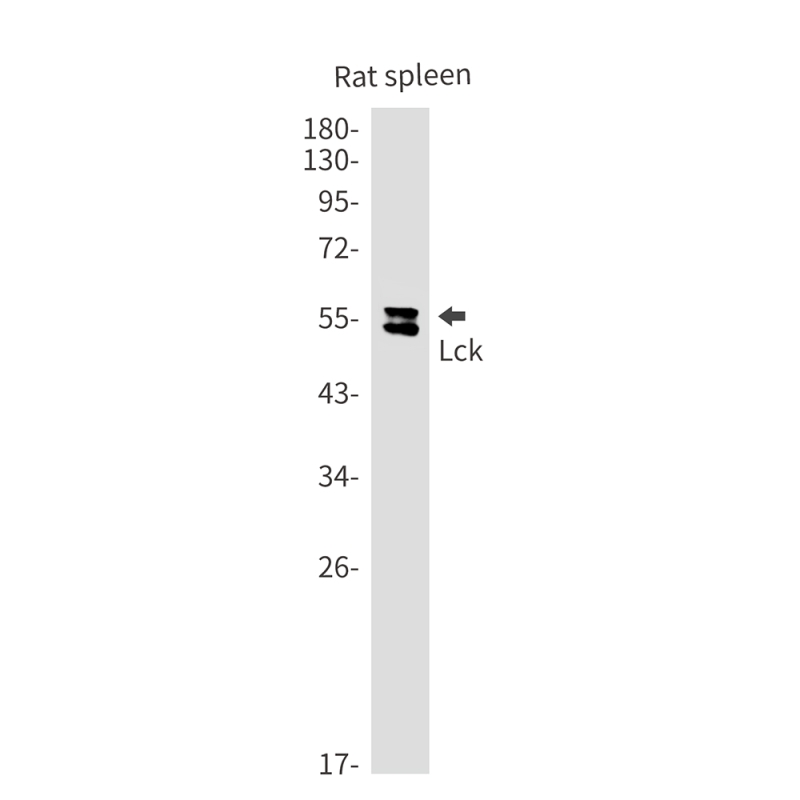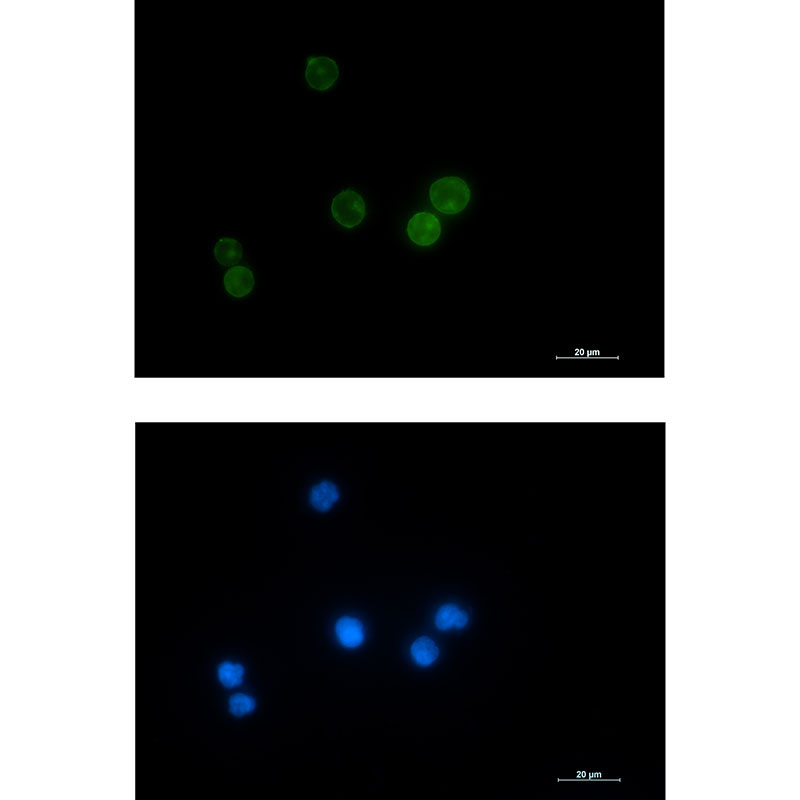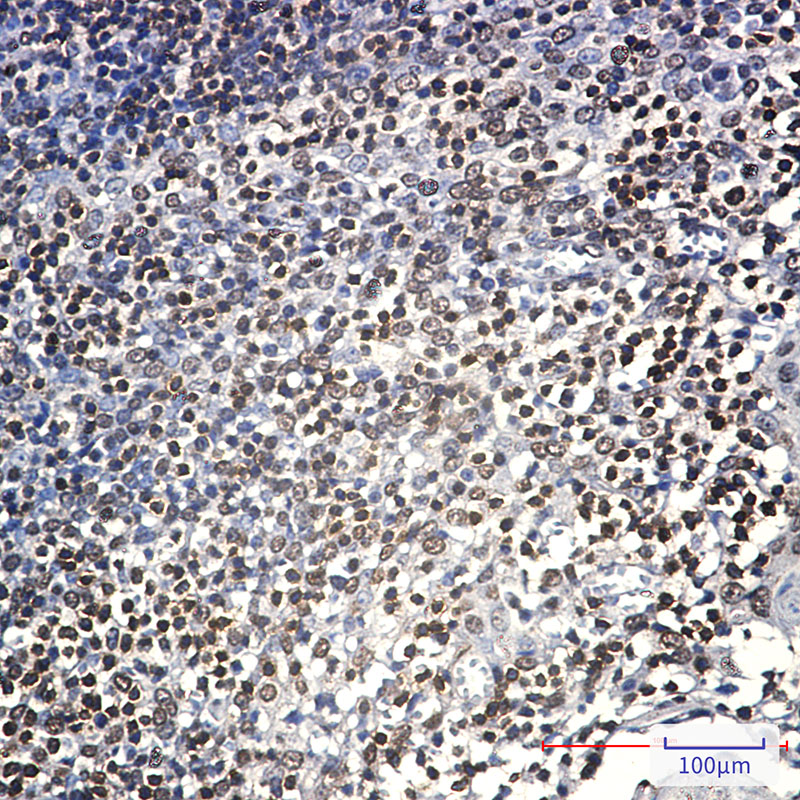



| WB | 1/500-1/1000 | Human,Mouse,Rat |
| IF | 1/20 | Human,Mouse,Rat |
| IHC | 1/50-1/100 | Human,Mouse,Rat |
| ICC | 1/50-1/200 | Human,Mouse,Rat |
| FCM | 咨询技术 | Human,Mouse,Rat |
| Elisa | 咨询技术 | Human,Mouse,Rat |
| Aliases | LCK; Tyrosine-protein kinase Lck; Leukocyte C-terminal Src kinase; LSK; Lymphocyte cell-specific protein-tyrosine kinase; Protein YT16; Proto-oncogene Lck; T cell-specific protein-tyrosine kinase; p56-LCK |
| Entrez GeneID | 3932 |
| WB Predicted band size | Calculated MW: 58 kDa; Observed MW: 58 kDa |
| Host/Isotype | Rabbit IgG |
| Antibody Type | Primary antibody |
| Storage | Store at 4°C short term. Aliquot and store at -20°C long term. Avoid freeze/thaw cycles. |
| Species Reactivity | Human,Rat |
| Immunogen | Recombinant protein of human Lck |
| Formulation | Purified antibody in TBS with 0.05% sodium azide,0.05%BSA and 50% glycerol. |
+ +
以下是3条关于Lck抗体的参考文献示例(内容为模拟概括,非真实文献):
1. **文献名称**:*"Lck tyrosine kinase is essential for T cell receptor signaling"*
**作者**:Weiss A, et al.
**摘要**:通过Lck抗体阻断实验和小鼠模型,证明Lck在T细胞受体(TCR)信号传导中的核心作用,Lck缺失导致T细胞无法激活及下游信号通路中断。
2. **文献名称**:*"Antibody-based detection of Lck activation in immune synapses"*
**作者**:Davis SJ, et al.
**摘要**:利用特异性Lck抗体结合免疫荧光技术,揭示了Lck在T细胞与抗原呈递细胞接触界面(免疫突触)中的动态磷酸化及空间分布特征。
3. **文献名称**:*"Lck regulates inflammatory responses in autoimmune diseases: Insights from antibody-mediated inhibition"*
**作者**:Li Z, et al.
**摘要**:研究使用Lck中和抗体抑制其激酶活性,发现Lck通过调控Th17细胞分化加剧类风湿性关节炎,提示其作为治疗自身免疫疾病的潜在靶点。
4. **文献名称**:*"Comparative analysis of commercial Lck antibodies for flow cytometry applications"*
**作者**:Smith K, et al.
**摘要**:系统评估不同厂商的Lck抗体在流式细胞术中的灵敏度和特异性,为实验选择提供参考依据。
(注:以上文献为示例性内容,实际引用需查询真实数据库如PubMed或Web of Science。)
Lck (lymphocyte-specific protein tyrosine kinase) is a member of the Src family of tyrosine kinases, primarily expressed in T cells and natural killer (NK) cells. It plays a pivotal role in T-cell receptor (TCR) signaling by initiating downstream phosphorylation cascades upon antigen recognition. Lck interacts with the cytoplasmic domains of CD4 or CD8 co-receptors, enabling its recruitment to TCR complexes. This proximity facilitates phosphorylation of immunoreceptor tyrosine-based activation motifs (ITAMs) on TCR-associated CD3 chains, promoting ZAP-70 activation and subsequent signaling events crucial for T-cell activation, proliferation, and cytokine production. Dysregulation of Lck activity is implicated in immune disorders, including autoimmune diseases and immunodeficiencies, as well as T-cell malignancies.
Lck antibodies are essential tools for studying TCR signaling dynamics and Lck's functional roles. These antibodies enable detection of Lck expression, phosphorylation status (e.g., at Tyr394 for activation or Tyr505 for inhibition), and protein-protein interactions via techniques like Western blotting, immunoprecipitation, and immunofluorescence. Researchers also utilize Lck inhibitors or activating antibodies to modulate T-cell responses in experimental models. Structural studies using Lck-specific antibodies have revealed insights into its regulatory SH3 and SH2 domains, catalytic kinase domain, and conformational changes governing activity. In clinical contexts, Lck expression patterns serve as biomarkers for certain lymphoproliferative disorders, highlighting its diagnostic and therapeutic relevance.
×